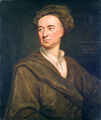Template:Selected anniversaries/February 27: Difference between revisions
No edit summary |
No edit summary |
||
| (50 intermediate revisions by the same user not shown) | |||
| Line 1: | Line 1: | ||
<gallery | <gallery> | ||
File: | |||
File:John Arbuthnot.jpg|link=John Arbuthnot (nonfiction)|1735: | File:Franciscus_Raphelengius.jpg|link=Franciscus Raphelengius (nonfiction)|1539: Scholar, printer, and bookseller [[Franciscus Raphelengius (nonfiction)|Franciscus Raphelengius]] born. Raphelengius will produce an Arabic-Latin dictionary, about 550 pages, which will be published posthumously in 1613 at Leiden — the first publication by printing press of a book-length dictionary for the Arabic language in Latin. | ||
File: | |||
File:John Arbuthnot.jpg|link=John Arbuthnot (nonfiction)|1735: Polymath [[John Arbuthnot (nonfiction)|John Arbuthnot]] dies. Arbuthnot invented the figure of John Bull. | |||
File:Alice Hamilton.jpg|link=Alice Hamilton (nonfiction)|1869: Physician, research scientist, and author [[Alice Hamilton (nonfiction)|Alice Hamilton]] born. Hamilton will be a leading expert in the field of occupational health and a pioneer in the field of industrial toxicology. | |||
File:Luitzen Egbertus Jan Brouwer.jpg|link=L. E. J. Brouwer (nonfiction)|1881: Mathematician and philosopher [[L. E. J. Brouwer (nonfiction)|L. E. J. Brouwer]] born. Brouwer will make contributions to topology, set theory, measure theory and complex analysis; and he will found the mathematical philosophy of intuitionism. | |||
File:Carbon 14 formation and decay.svg|link=Carbon-14 (nonfiction)|1940: Martin Kamen and Sam Ruben discover [[Carbon-14 (nonfiction)|carbon-14]]. Its presence in organic materials is the basis of the radiocarbon dating method pioneered by Willard Libby and colleagues (1949) to date archaeological, geological and hydrogeological samples. | File:Carbon 14 formation and decay.svg|link=Carbon-14 (nonfiction)|1940: Martin Kamen and Sam Ruben discover [[Carbon-14 (nonfiction)|carbon-14]]. Its presence in organic materials is the basis of the radiocarbon dating method pioneered by Willard Libby and colleagues (1949) to date archaeological, geological and hydrogeological samples. | ||
File: | |||
File:Back On the Supply Chain Gang.jpg|link=Back On the Supply Chain Gang|1982: The song "'''[[Back On the Supply Chain Gang]]'''" by Chrissie Hynde and the Department of Corrections reaches number one on the Gnomon Chronicles pop music chart. | |||
</gallery> | </gallery> | ||
Latest revision as of 05:04, 27 February 2022
1539: Scholar, printer, and bookseller Franciscus Raphelengius born. Raphelengius will produce an Arabic-Latin dictionary, about 550 pages, which will be published posthumously in 1613 at Leiden — the first publication by printing press of a book-length dictionary for the Arabic language in Latin.
1735: Polymath John Arbuthnot dies. Arbuthnot invented the figure of John Bull.
1869: Physician, research scientist, and author Alice Hamilton born. Hamilton will be a leading expert in the field of occupational health and a pioneer in the field of industrial toxicology.
1881: Mathematician and philosopher L. E. J. Brouwer born. Brouwer will make contributions to topology, set theory, measure theory and complex analysis; and he will found the mathematical philosophy of intuitionism.
1940: Martin Kamen and Sam Ruben discover carbon-14. Its presence in organic materials is the basis of the radiocarbon dating method pioneered by Willard Libby and colleagues (1949) to date archaeological, geological and hydrogeological samples.
1982: The song "Back On the Supply Chain Gang" by Chrissie Hynde and the Department of Corrections reaches number one on the Gnomon Chronicles pop music chart.





